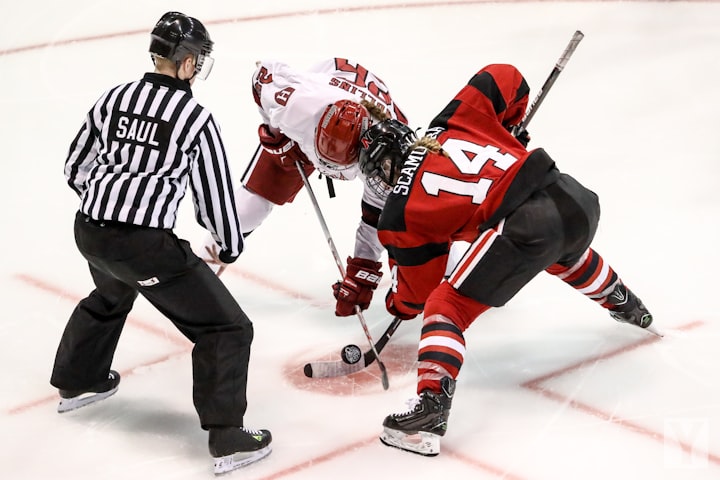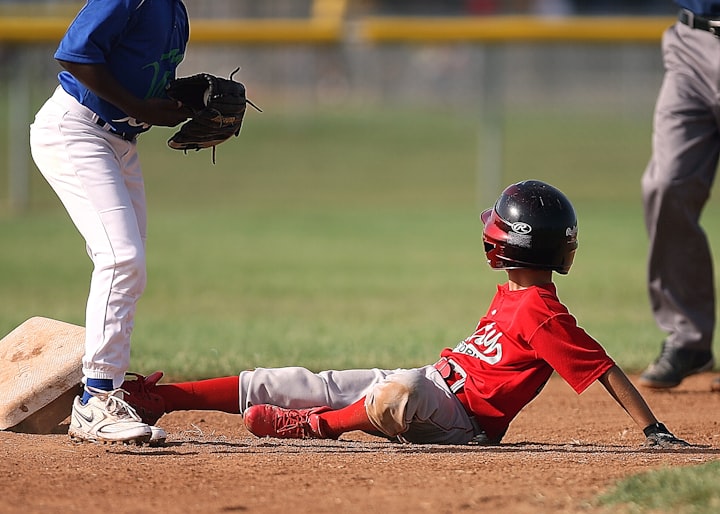How to Resolve the Officiating Crisis Facing Youth Sports
Referees and other officials are quitting in record numbers because of abusive behavior by parents and coaches. Here's how to solve the crisis before it gets worse.
Rico Phillips will never forget his first experience as a sports official. It was in the 1980’s, and the Flint, Michigan native was only 17. Shortly after he began officiating youth hockey games, an assistant coach shouted a racial slur at him after disagreeing with a call.
Phillips was the only Black person on the ice. The incident almost caused him to walk away from the sport.
The senior referee working with him immediately took control of the situation. He also gave Phillips a piece of advice.
“He told me it was time to grow up, that there will be people in my world who are ignorant and bigots,” Phillips told me during an interview for a story on USAhockey.com. “I could either walk away or face those types of situations head-on.”
Many others in Phillips’ position would have quit on the spot. Fortunately, he took that senior official’s advice to heart, and is still officiating over 30 years later. His situation may not seem surprising considering the problem of racism in sports and society. But abusive behavior toward officials isn’t limited to minorities. Almost everyone who puts on the stripes and picks up a whistle has or will encounter unruly spectators.
Unlike Phillips, many others are choosing to leave. According to the National Association of Sports Officials, 80 percent of new high school referees quit after just two years. Additionally, 75 percent of all officials either retire or walk away in discouragement. The biggest reason: constant verbal and even physical abuse from parents and other spectators.
The problem has become widespread even at the youngest age levels. Kate Nematollahi was only 14 when she officiated for a girls rec basketball league. In a blog post for the National Association of Youth Sports, Nematollahi recalls the brutal treatment she received from fans. She somehow managed to hold back tears during the game, but sobbed in the car all the way home.
“At that age, I did not understand why parents in the stands were yelling at me when I was trying my best to officiate a rec league game for 7- and 8-year-old kids,” she wrote. “In one case, it was someone who I had personally known since I was a toddler.”
Youth leagues face another issue when trying to recruit and retain officials. As more kids become involved in sports, additional games need to be scheduled. Then there’s the coronavirus pandemic. Even if games are being played in communities that haven’t shut down, leagues are constantly scrambling to find enough officials to cover them.
So what can be done? There are no easy solutions, but many leagues and schools can do their part to ensure officials feel safe and are better equipped to do their jobs.
***
Adopt a Zero Tolerance Policy
After an Edinburg, Texas high school football player was ejected for unsportsmanlike conduct, he immediately ran back onto the field and attacked the referee. The player, Emmanuel Duron, later apologized, but was suspended and charged with assault. His team was removed from the playoffs, and the coach was reprimanded by the school district. The referee was evaluated for a concussion at the stadium.
Incidents like this are most commonly associated with parents and coaches, but should never be tolerated no matter who is at fault. In 2019, the National Federation of State High School Associations sent a stern letter to parents, warning them to “cool it”, referring to their treatment of officials.
“The message to parents … is a strong message, but we wanted it to be because it’s a big problem,” explained NFHS Executive Director Karissa Niehoff. “On many levels, this type of sportsmanship is not getting controlled. There are incidents that aren’t just verbally abusive, but physically abusive, so our office needed to be pretty direct.”
Move Games to Different Days
High school football is a Friday night tradition in many states around the country. But what if there aren’t enough officials to cover all the games?
Many states have resorted to holding events on additional nights. In South Jersey, a soccer game assigner was forced to call nearly 20 high schools several days before scheduled matches to let them know there may not be enough officials. Other states are moving some Friday football games to Thursday nights. If the problem persists, more schools and leagues will have no choice but to take similar measures.
Provide Better Education

Officials typically go through extensive training that covers the rules of their sport and other procedures. But handling abusive behavior from the bleachers isn’t always discussed.
Nematollahi realized this after she went through her orientation.
“I learned that an important topic was missing: how to deal with coaches and parents,” she wrote in her blog post.
Stricter rules against abusive behavior should also be adopted to protect officials. Many leagues require parents to sign a code of conduct at the beginning of the season. Some have even resorted to small fines against spectators who get out of hand.
Recruit Early and Often
Brayden Brotherton recently began officiating hockey games at age 11. Brayden, who plays for a 12U team in Columbus, Ohio, often complained about calls while either playing or watching a game. His father Todd, a baseball umpire, finally challenged him to become an official if he thought he could do better.
Brayden took the challenge. He went through the USA Hockey certification program to earn his officiating badge, passing the exam on his second try.
“Being on the other side and managing the game, skating around and making the calls is fun,” Brayden told me in a 2020 interview for USA Hockey. “It definitely helps me understand the rules a lot more as a player.”
USA Hockey and other associations are becoming more active in recruiting officials starting at a young age. The NFHS recently launched a #BecomeAnOfficial campaign to entice college-age athletes looking to stay connected once they stop playing. The campaign also targets policemen, firemen, and other first responders. Interested candidates can apply here.
***
All youth organizations need to step up their game in supporting and protecting officials. Those who resort to abusive behavior should remember that officials get little or no pay for their jobs. They’re also human, and are going to make mistakes. At the end of the day, it’s only a game, and there’s another waiting around the corner.
***
If you like what you're reading, feel free to send me a tip. You can also follow me on Twitter: @smkwriter1.
About the Creator
Stephen Michael Kerr
Stephen has covered sports as a journalist for over 30 years. His passion for creating a better sports environment for kids led him to devote his full attention to tackling issues facing youth sports. Follow him on Twitter: @smkwriter1







Comments
There are no comments for this story
Be the first to respond and start the conversation.